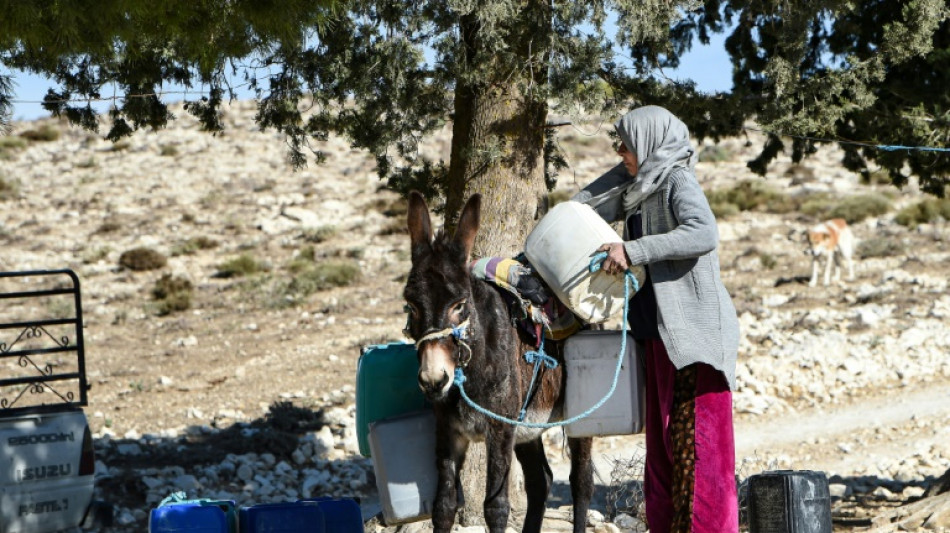
-
 Djokovic crashes to nervous Arnaldi in Madrid opener
Djokovic crashes to nervous Arnaldi in Madrid opener
-
Syria's Kurds demand 'democratic decentralised' Syria
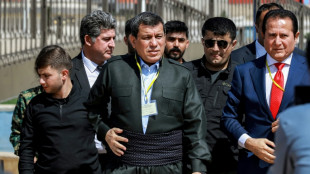
-
 Leverkusen win to delay Bayern and Kane's title party
Leverkusen win to delay Bayern and Kane's title party
-
Buenos Aires farewells native pontiff with tears and calls to action
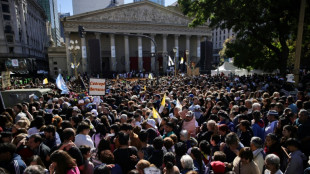
-
 Turkey's opposition says Erdogan's canal plan behind latest arrests
Turkey's opposition says Erdogan's canal plan behind latest arrests
-
Maresca hails 'nasty' Chelsea as top five bid stays alive

-
 Trump raises Putin doubts after Zelensky talks at pope's funeral
Trump raises Putin doubts after Zelensky talks at pope's funeral
-
Major blast at Iran port kills 4, injures hundreds

-
 Napoleon's sword to be sold at auction in Paris
Napoleon's sword to be sold at auction in Paris
-
Iran, US discuss nuclear deal in third round of talks

-
 Buenos Aires farewells native pontiff with call to action
Buenos Aires farewells native pontiff with call to action
-
Warholm sets hurdles world record at Diamond League, Holloway shocked

-
 US students 'race' sperm in reproductive health stunt
US students 'race' sperm in reproductive health stunt
-
Wikileaks founder Assange joins crowds for pope funeral

-
 Leader Marc Marquez claims Spanish MotoGP sprint victory
Leader Marc Marquez claims Spanish MotoGP sprint victory
-
Celtic win fourth successive Scottish Premiership title

-
 Jackson ends drought as Chelsea boost top five push
Jackson ends drought as Chelsea boost top five push
-
Warholm sets 300m hurdles world record in Diamond League opener

-
 Major blast at south Iran port kills 4, injures hundreds
Major blast at south Iran port kills 4, injures hundreds
-
Russia says retook Kursk from Ukraine with North Korean help

-
 Francis laid to rest as 400,000 mourn pope 'with an open heart'
Francis laid to rest as 400,000 mourn pope 'with an open heart'
-
Trump, Zelensky meet on sidelines of pope's funeral

-
 'Shared loss': Filipino Catholics bid Pope Francis farewell
'Shared loss': Filipino Catholics bid Pope Francis farewell
-
Families unable to reunite as India-Pakistan border slams shut
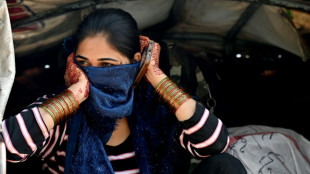
-
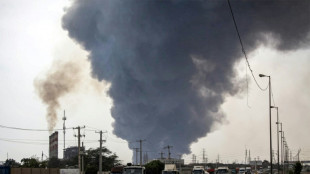 Major blast at south Iran port injures hundreds
Major blast at south Iran port injures hundreds
-
Foreign carmakers strive for 'China Speed' to stay in race
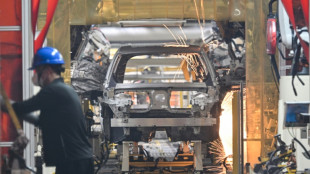
-
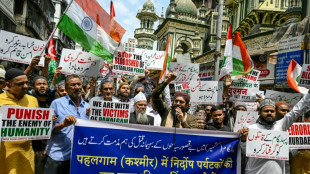 Pakistan says open to neutral probe into Kashmir attack after India threats
Pakistan says open to neutral probe into Kashmir attack after India threats
-
Hundreds of thousands at funeral mourn pope 'with an open heart'
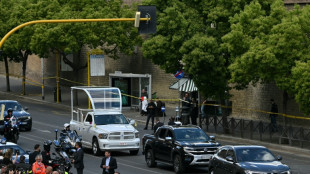
-
 Quartararo sets Spanish MotoGP record to claim pole
Quartararo sets Spanish MotoGP record to claim pole
-
Hamas says open to 5-year Gaza truce, one-time hostages release
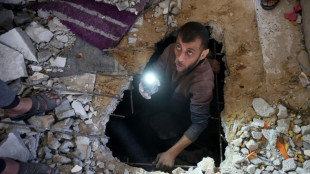
-
 Iran, US hold new round of high-stakes nuclear talks
Iran, US hold new round of high-stakes nuclear talks
-
Up at dawn for front-row seat to history at Francis's funeral

-
 Pakistan ready to 'defend sovereignty' after India threats
Pakistan ready to 'defend sovereignty' after India threats
-
Huge crowds flock to Vatican for Pope Francis's funeral

-
 Xi says China must 'overcome' AI chip challenges
Xi says China must 'overcome' AI chip challenges
-
Indian army says new exchange of gunfire with Pakistan

-
 Epstein accuser Virginia Giuffre takes own life in Australia: family
Epstein accuser Virginia Giuffre takes own life in Australia: family
-
Hundreds of buildings damaged, dozens injured in 6.3 Ecuador quake

-
 India and Pakistan's Kashmir fallout hits economy too
India and Pakistan's Kashmir fallout hits economy too
-
Francis's funeral to be grand farewell to 'pope of the poor'

-
 Pogacar faces defiant Evenepoel at Liege-Bastogne-Liege
Pogacar faces defiant Evenepoel at Liege-Bastogne-Liege
-
Chelsea eye great escape against Barcelona in Women's Champions League

-
 Iran, US to hold new round of high-level nuclear talks
Iran, US to hold new round of high-level nuclear talks
-
'Energy and effort' pay off for Reds as Blues' woes continue

-
 Albatross and closing birdie lift China's Liu to LPGA Chevron lead
Albatross and closing birdie lift China's Liu to LPGA Chevron lead
-
On the horizon? Wave of momentum for high seas treaty

-
 New to The Street Launches For The Causes(TM) Monthly Awareness Segments: Offering Free National Media to Charities and Organizations
New to The Street Launches For The Causes(TM) Monthly Awareness Segments: Offering Free National Media to Charities and Organizations
-
Top Mistakes to Avoid When Building Credit History

-
 Developing countries should fast-track US trade deals: World Bank president
Developing countries should fast-track US trade deals: World Bank president
-
Grizzlies' Morant 'doubtful' for must-win game 4 v Thunder


'Living dead': Tunisian villages suffer drought, climate change
Tunisian villager Ounissa Mazhoud ties two empty jerry cans to a donkey and cautiously descends a stony hill towards the last local source of water.
The North African country, in its fourth year of drought, is grappling with its worst water scarcity in years.
Mazhoud -- like other women in the remote village of Ouled Omar, 180 kilometres (110 miles) southwest of the capital Tunis -- wakes up every morning with one thing on her mind: finding water.
"We are the living dead ... forgotten by everyone," said Mazhoud, 57, whose region was once one of Tunisia's most fertile, known for its wheat fields and Aleppo pines.
"We have no roads, no water, no aid, no decent housing, and we own nothing," she said, adding that the closest source of water is a river about an hour's arduous walk away.
Providing water for their families, she said, means that "our backs, heads and knees hurt, because we labour from dawn to dusk".
- 'Absolute water scarcity' -
The World Bank predicts that by 2030 the Middle East and North Africa region will fall below the "absolute water scarcity" threshold of 500 cubic metres yearly per person.
Tunisia, already the 33rd most water-stressed country according to the World Resources Institute, has dropped to 450 cubic metres per inhabitant.
Its dams -- the primary source for drinking water and irrigating crops -- are filled at just 22 percent capacity, despite brief showers recently, according to official figures.
Some 20 dams have already gone out of service, mostly in the most arid south.
Last spring, Tunisian authorities introduced water rationing to limit household use even in major cities.
But in remote villages, where water scarcity impacts crucial farming and livestock, the issue takes on even greater weight.
Ounissa's 65-year-old husband, Mahmoud Mazhoud, said their village has become unable to support livestock, forcing him to sell half of his cow herd so he could afford to keep the rest alive.
Ouled Omar is home to 22 families who share the only remaining spring.
They say it yields only about 10 litres (2.6 gallons) of water per day in total, but that it is undrinkable.
- 'Sources dried up' -
Ramzi Sebtaoui, a stockbreeder in his thirties, brings water to his family every day by driving to the closest source, some 20 kilometres away in the city of Maktar.
"Two or three years ago, the situation was much better, with many natural sources of water that we could use for livestock," he said.
"Today, due to climate change and other factors, almost all sources have dried up, and the roads are destroyed."
Last week, Ouled Omar residents travelled almost 50 kilometres to the city of Siliana to protest outside governorate offices, demanding a paved road and access to clean water.
"They don't have a source of drinking water, not even taps," Houda Mazhoud, a researcher who has been advocating for Ouled Omar's access to clean water for years, told AFP.
"As a result, they use a natural source. But with climate change, it's starting to disappear."
- 'Houses remain empty' -
The only road that leads to the village is decrepit and hasn't been paved in decades, and residents say this only deepens their sense of isolation.
Some villagers have felt pushed to move to urban areas or abroad.
About 300,000 of Tunisia's 12 million people have no drinking water in their homes, according to the Tunisian Forum for Economic and Social Rights.
Ounissa's cousin, Djamila Mazhoud, 60, said her son and two daughters had all left in search of better lives.
"We educated our children so that when we grow old, they take care of us, but they couldn't," she said.
"People are either unemployed or eaten by the fish in the sea," she added, using a common phrase for migrants who attempt the dangerous sea voyages for Europe.
Entire families have already left the village, said Djamila.
"Their houses remain empty," she said, explaining that elderly people feel they have no choice but to follow their sons and daughters.
"Can an 80-year-old go to the river to get water?"
F.Dubois--AMWN



